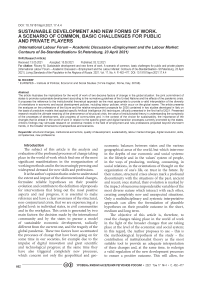Sustainable development and new forms of work. A scenario of common, basic challenges for public and private players (international labour forum - academic discussion "Employment and the labour market: contours of de-standardisation" St.Petersburg, 23 Apr)
Автор: Ricceri Marco
Журнал: Уровень жизни населения регионов России @vcugjournal
Рубрика: Экономические исследования
Статья в выпуске: 4 т.17, 2021 года.
Бесплатный доступ
The article illustrates the implications for the world of work of two decisive factors of change in the global situation: the joint commitment of states to promote sustainable development according to the normative guidelines of the United Nations and the effects of the pandemic crisis. It proposes the reference to the institutionalist theoretical approach as the most appropriate to provide a valid interpretation of the diversity of orientations in economic and social development policies, including labour policies, which occur on the global scene. The article presents the analyzes on the professions of the future and the relative employment prospects for 2030 contained in two studies developed in Italy on the basis of predictive models that applied specific Artificial Intelligence (AI) techniques, officially presented in the first half of 2021. Presented research recalls the ultimate meaning of the phenomenon of structural crisis, the value of institutionalist theory in understanding the complexity of the processes of development, and progress of communities and, in the context of the choice for sustainability, the importance of the changes that lie ahead in the world of work in relation to the specific green and digital transition processes currently promoted by the states. Article’s findings may stimulate research on predictive models in the field of employment and new professions projected beyond short-term trends, in the broader dimensions of perspectives and scenarios
Structural changes, institutional economics, quality of development, sustainability, labour market changes, digital revolution, skills, competences, new professions
Короткий адрес: https://sciup.org/143178407
IDR: 143178407 | DOI: 10.19181/lsprr.2021.17.4.4
Список литературы Sustainable development and new forms of work. A scenario of common, basic challenges for public and private players (international labour forum - academic discussion "Employment and the labour market: contours of de-standardisation" St.Petersburg, 23 Apr)
- Assolombarda, Universit? Cattolica del Sacro Cuore, CRIPS: Le Professioni del Futuro. Come la Tecnologia e la PandemiaModificano Il Mercato del Lavoro Lombardo [The Professions of the Future: How Technology and the Pandemic Modify the Lombard Labor Market], Ricerca (Research). №1, Milano, 2021.
- Bakhshi H., Downing J., Osborne M., Schneider P. The Future of Skills: Employment in 2030. London: Persons and Nesta, 2017.
- Brookfield Institute for Innovation, Entrepreneuship e Nesta. Ahead by a Decade: Employment in 2030. 2020.
- Brynjolfsson E., Mitchell T. What can machine learning do? Work-force implications // Science. 2017. Vol. 358. №6370. P.1530–1534.
- Cavalli A., Doulgas M. Istituzioni. Processi e tipologia // Enciclopedia delle Scienze sociali [Encyclopaedia of Social Sciences]. Treccani. Roma. 1996. 122 p.
- Ernst&Young, Manpower Group, Pearson. Professioni 2030: il future delle competenze in Italia [Job 2030: the future of the competences in Italy]. Milan, February 2021.
- Felten EW, Raj M, Seamans R. The Occupational Impact of Artificial Intelligence: Labor, Skills, and Polarization // SSRN Electronic Journal. 2019. DOI: 10.2139/ssrn.3368605.
- Frey C.B., Osborne M.A. The future of employment: How susceptible are jobs to computerisation? // Technological Forecasting and Social Change. 2017. Vol. 114. №C. P. 254 – 280. DOI: 10.1016/j.techfore.2016.08.019.
- Glaziev S. Strategy for growth in the contest of the global economic crisis. European Academy of Natural Science, Hanover, 2015.
- Hodgson G.M. What are institutions? // Journal of Economic Issues. 2006. Vol. 40. №1. P. 1-25. DOI: 10.1080/00213624.2006.11506879.
- Hodgson G.M. Evolutionary and Institutional Economics as the New Mainstream? // Evolutionary and Institutional Economics review. 2007. Vol. 4. №1. P. 7-25. DOI: 10.14441/eier.4.7.
- Hodgson G.M. Conceptualizing Capitalism. Institutions, Evolution, Future, University of Chicago Press, Chicago, 2015.
- Ostrom E. Understanding Institutional Diversity, Princeton University Press, Princeton, 2005.
- Screpanti E. The fundamental institutions of capitalism, Routledge, London, 2001, 257 p.
- Veblen T. The Place of Science in Modern Civilisation and Other Essays, Huebsch, New York, 1919, 239 p.


